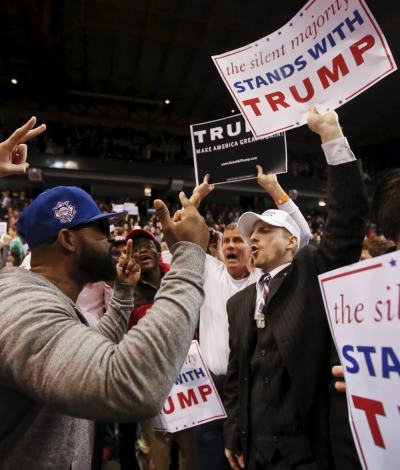Is Donald Trump a 'Populist' or an 'Authoritarian'?

Donald Trump's surprisingly high support among the electorate may be because his message resonates as a populist, rather than authoritarian, leader.
In recent months several experts and pundits have concluded that Trump became the frontrunner for the Republican nomination due to his appeal to what psychologists dub the "authoritarian personality."
However, others including Reason magazine editor-in-chief Nick Gillespie, argue that Trump's supporters are driven by populism instead of authoritarianism.

In a column published Monday, Gillespie says Trump is better understood as a populist, which explains how "he can get away with sloppy, inconsistent thinking."
"When Ted Cruz (or National Review, for that matter) attack Trump as weak on immigration because he will let some of the Mexicans he just deported back into the United States, they think they've found his weak spot," wrote Gillespie.
"But The Donald's followers aren't looking for an ironclad, systematic view of the world. They want someone who empathizes with them, who acknowledges their anger, and will move decisively to change things in clear ways."
Gillespie cited research conducted earlier this month by political scientists Wendy Rahn and Eric Oliver, whose work was published by The Washington Post.
Conducting a poll of 1,044 adult citizens, Rahn and Oliver wrote that Trump supporters tended to be more populist, while supporters of Trump opponent U.S. Senator Ted Cruz were more likely to be authoritarian.
"Of course, authoritarians and populists can overlap and share dark tendencies toward nativism, racism and conspiracism. But they do have profoundly different perceptions of authority," wrote Rahn and Oliver.
"Populists see themselves in opposition to elites of all kinds. Authoritarians see themselves as aligned with those in charge. This difference sets the candidates' supporters apart."
The psychological traits Rahn and Oliver measured in their data was "authoritarianism," "anti-elitism," "mistrust experts," and "american identity."
"Trump voters are the only ones to score consistently high on all three populist dimensions. Cruz and Rubio's supporters, for example, don't express high feelings of anti-elitism," continued Rahn and Oliver.
"[T]he voters who look most authoritarian are not those following Trump but those following Cruz. Not only do they score highest on the authoritarian scales, they also have that combination of populist elements correlated most strongly with authoritarianism. They are mistrustful of intellectuals and experts, highly nationalistic, yet strongly aligned with political and economic elites."
The Gillespie column and the research it is based upon came largely in response to a Politico story authored by University of Massachusetts, Amherst Ph.D. candidate Matthew MacWilliams.
MacWilliams reported that in December he did a national poll of 1,800 voters to explain the support for Trump, arguing that Trump supporters tended toward the authoritarian personality.
"Running a standard statistical analysis, I found that education, income, gender, age, ideology, and religiosity had no significant bearing on a Republican voter's preferred candidate," wrote MacWilliams.
"Only two of the variables I looked at were statistically significant: authoritarianism, follow by fear of terrorism, though the former was far more significant than the latter."





















